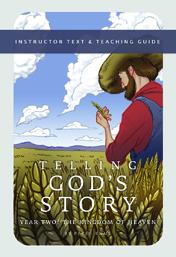The Bible Tells Me So: Why Defending the Bible Has Made us Unable to Read It.
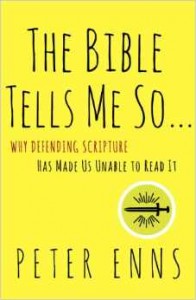 September 2014, HarperOne.
September 2014, HarperOne.
What if the Bible is fine just the way it is? Not a well behaved Bible, where everything lines up and makes sense, but the messy, troubling, and weird Bible we actually have? What if the the Bible doesn’t need to be protected and defended, but understood–just as it is? What if the real problem isn’t the Bible but the false expectations we sometimes bring to it? Perhaps, when we let the Bible be the Bible rather than what we expect it ought to be–or need it to be–we will find a deeper faith in the process.
Order at Amazon or Barnes & Noble.
Five Views on Biblical Inerrancy
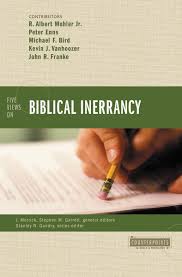 Co-written with John Franke, Kevin Vanhoozer, Michael Bird, and Al Mohler, Zondervan, 2013
Co-written with John Franke, Kevin Vanhoozer, Michael Bird, and Al Mohler, Zondervan, 2013
There is little doubt that the inerrancy of the Bible is a current and often contentious topic among evangelicals. Five Views on Biblical Inerrancy represents a timely contribution by showcasing the spectrum of evangelical positions on inerrancy, facilitating understanding of these perspectives, particularly where and why they diverge.
Baker Illustrated Bible Dictionary,
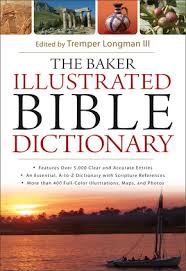 Co-editor with Tremper Longman III and Mark Strauss, Baker, 2013
Co-editor with Tremper Longman III and Mark Strauss, Baker, 2013
This comprehensive dictionary intends to help people read the Bible with increased understanding and confidence. It contains articles on major topics as well as places and people, even if they just appear in a single verse in the Bible. Its articles cover theological topics, biblical words, biblical imagery, and historical topics.
The Bible and the Believer: Reading the Bible Critically and Religiously,
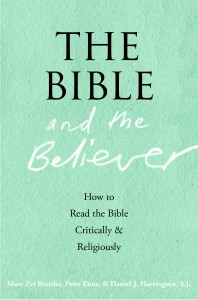 Co-written with Marc Brettler and Daniel Harrington, Oxford, 2012
Co-written with Marc Brettler and Daniel Harrington, Oxford, 2012
Can the Bible be approached both as sacred scripture and as a historical and literary text? For many people, it must be one or the other. How can we read the Bible both ways? The Bible and the Believer illustrates how to read the Hebrew Bible/ Old Testament critically and religiously from three religious perspectives. and tackle a dilemma that not only haunts biblical scholarship today, but also disturbs students and others exposed to biblical criticism for the first time, either in university courses or through their own reading. Failure to resolve these conflicting interpretive strategies often results in rejection of either the critical approach or the religious approach–or both.
Genesis for Normal People: A Guide to the Most Controversial, Misunderstood, and Abused Book of the Bible
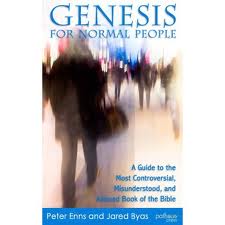 Co-written with Jared Byas,Patheos Press, e-book, 2012.
Co-written with Jared Byas,Patheos Press, e-book, 2012.
This is a guidebook for normal people. In one sense, you might wonder whether or not you qualify as normal. If we knew you, we might wonder too. But what we mean is that this book is for the everyday person, the person who has never went to seminary but is curious about how to read the book of Genesis.
Purchase Genesis for Normal People
Telling God’s Story (year two)
Olive Branch Books, 2012
[See description below under “Year One”]
Purchase Telling God’s Story: Year Two
The Evolution of Adam: What the Bible Does and Doesn’t Say about Human Origins
 Brazos, 2012
Brazos, 2012
An accesible study of the hermeneutical issues involved in reading Genesis and Paul on Adam in view of evolution. The Adam story in Genesis is part of Israel’s literature of national and religious self-definition, not the origin of humanity. Paul’s use of the Adam story, like Paul’s other uses of the Old Testament, is marked by creativity and the prior conviction that Jesus is God’s unexpected solution to a universal plight.
Purchase The Evolution of Adam
Ecclesiastes
Eerdmans, 2011. Two Horizons series.
The focus of this series is on theological interaction with biblical texts.The commentary is divided into two parts roughly equal in length.(1) Interaction with the Hebrew text . (2) Interacting with the theology of Ecclesiasties, where much of my focus is on seeing Qohelet as a figure of honest doubt and suffering, and therefore a Christ-figure and model for one’s faith journey.
Purchase Ecclesiastes
Telling God’s Story (Parent Guide)
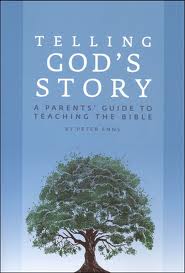 Olive Branch Books, 2010.
Olive Branch Books, 2010.
Telling God’s Story: A Parents’ Guide to Teaching the Bible gives parents a grasp of what the Bible is (and is not), and helps them communicate its message to their children faithfully, powerfully, and with joy. This book provides parents and teachers with a straightforward and intelligent twelve-year plan for teaching the Bible.
Beginning with the Gospels to introduce the youngest students to Jesus, continue on to larger segments of the biblical story for middle grade students, and finally guiding high school students into a vital understanding of the history and culture of biblical times.
Purchase Telling God’s Story: A Parents’ Guide to Teaching the Bible
Telling God’s Story (Year One)
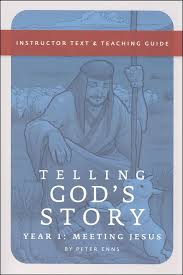 Olive Branch Books, 2010.
Olive Branch Books, 2010.
The first level in a twelve-level series designed to take young students from elementary through high school, Telling God’s Story: Year One provides weekly lessons for elementary-grade students, based on the parables and the Gospels. The Instructor Text and Teaching Guide contains pithy, content-filled background information for the teacher, a biblical passage to read aloud, and a scripted explanation of the passage designed especially for young children to grasp with ease. The accompanying Activity Book provides historically accurate coloring pages, learning projects, and group activities to fill out an entire week of home, school, or Sunday School study.
Purchase Telling God’s Story: Year One
Eyes to See, Ears to Hear: Essays in Memory of J. Alan Groves
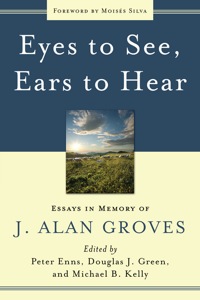 Co-edited with Douglas Green and Michael Kelly; P&R Publishing, 2010.
Co-edited with Douglas Green and Michael Kelly; P&R Publishing, 2010.
Al Groves was a deeply loved teacher and colleague, not to mention a true pioneer of modern biblical studies, using computers to analyze the Hebrew Old Testament. These articles have been collected to honor his work and also his character as a loving Christian exemplar.
Purchase Eyes to See, Ears to Hear: Essays in Memory of J. Alan Groves
Three Views on the New Testament’s Use of the Old Testament
 Co-written with Walter Kaiser and Darrell Bock; Zondervan, 2008
Co-written with Walter Kaiser and Darrell Bock; Zondervan, 2008
This book in the Counterpoints: Exploring Theology series introduces three approaches presently employed in the study of the uses of the Old Testament in the New Testament, especially in those instances where the New Testament authors discern the fulfillment of a prophetic element in the Old Testament text. The foundational issue concerns the relationship between an Old Testament author’s meaning and the meaning of that same passage when it is used by a New Testament author.
Purchase Three Views on the New Testament Use of the Old Testament
Dictionary of the Old Testament: Wisdom, Poetry, and Writings
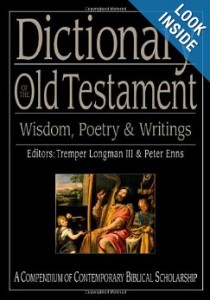 Co-editor with Tremper Longman III; IVP, 2008
Co-editor with Tremper Longman III; IVP, 2008
- Christianity Today “Award of Merit” for 2009
- Evangelical Christian Publishers Association’s “2009 Christian Book of the Year” award in the Bible Reference and Study category
This third Old Testament volume in InterVarsity Press’s celebrated “Black Dictionary” series offers nearly 150 articles covering all the important aspects of Job, Proverbs, Ecclesiastes, Psalms, Song of Songs, Lamentations, Ruth and Esther. Over ninety contributors, many of them experts in this literature, have contributed to the Dictionary of the Old Testament: Wisdom, Poetry & Writings. This volume maintains the quality of scholarship that students, scholars and pastors have come to expect from this series.
Purchase Dictionary of the Old Testament: Wisdom, Poetry & Writings
Invitation to Genesis
 Abingdon Press 2006
Abingdon Press 2006
“In the beginning…” These familiar words open the Book of Genesis and give voice to one of the foundational stories of the entire Old Testament. This short-term DISCIPLE Bible Study is an invitation to see Genesis not simply as a story about the beginning (Creation), but as a book about beginnings. From Adam and Eve to Noah to Abraham, Genesis recounts God’s persistence in “ starting over ” with the chosen people. It is a message both timeless and timely – for God’s people still seek the assurance that God is always working to make right what went wrong “in the beginning.”
Purchase Disciple Short Term Bible Study – Invitation to Genesis – Participant Book and Planning Kit
Inspiration and Incarnation: Evangelicals and the Problem of the Old Testament
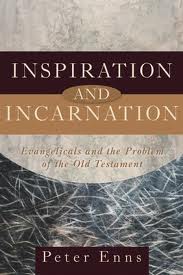 Baker Academic, 2005
Baker Academic, 2005
This study is focused on lay evangelical readers and suggests a reconsideration of their notion of Scripture in light of commonly accepted conclusions of biblical scholarship over the past several generations. My concern is to help readers whose faith has been challenged by critical studies, and I suggest that evangelical faith would be well served by moving beyond a predominantly defensive doctrine of Scripture to develop a positive view that seriously engages contemporary critical scholarship. My proposal is to employ an “incarnational” model of Scripture—one that recognizes and affirms both the divine and human aspects of the Bible.
Purchase Inspiration and Incarnation
Exodus: The NIV Application Commentary Zondervan, 2000This commentary is focused on providing Christoltelic readings of Exodus. Exodus itself is a powerful theological statement, and one that reaches its fullest expression in the death and resurrection of Christ, the new Moses.Purchase Exodus Zondervan, 2000This commentary is focused on providing Christoltelic readings of Exodus. Exodus itself is a powerful theological statement, and one that reaches its fullest expression in the death and resurrection of Christ, the new Moses.Purchase Exodus |
Exodus Retold: Ancient Exegesis of the Departure from Egypt in Wisdom 10:15-21 and 19:1-9 (Harvard Semitic Museum Monographs 57)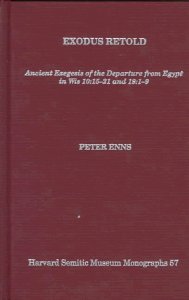
Scholars Press, 1997 A study in Second Temple hermeneutics focusing on the use of the Exodus traditions in the Wisdom of Solomon. The author of this work (often referred to as Pseudo-Solomon), while commenting on the biblical exodus, shows evidence of being influenced not only by interpretive techniques of the time period, but also interpretive traditions. This study provides a window onto one aspect of the use of Scripture in the Second Temple period, and has implications also for how we understand the NT’s use of the OT. Purchase Exodus Retold |
Poetry and Wisdom (IBR Bibliographies, No. 3) Baker Academic1997 Baker Academic1997
This is an annotated bibliography of several hundred secondary sources on biblical wisdom literature and poetry.Purchase Poetry and Wisdom |
